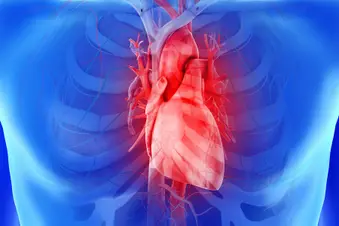
By Michele Norris, as told to Kara Mayer Robinson
I was diagnosed with heart failure almost 6 years ago after I began noticing that I needed to stop and catch my breath a lot while I was walking. I couldn’t even sing in my church’s choir anymore because I felt like I couldn’t get enough air.
I originally thought it was from seasonal pollen allergies or from asthma symptoms that I’d had during my youth that were reappearing.
But I knew it was more serious when I was visiting a sports stadium one day. I was walking up a ramp and I had to stop because I couldn’t breathe. Around that time, I also had serious swelling in my legs and had trouble wearing my shoes during the day.
I was concerned, so I went to my primary care doctor. My doctor prescribed medications for the swelling and an inhaler for asthma. Neither helped, so I got a referral to see a cardiologist. The cardiologist diagnosed me with heart failure.
Newly Diagnosed With Heart Failure
I was in complete shock. It was particularly emotional for me because I have a family history of heart failure. My mother and my maternal grandmother both had chronic heart failure. My mother died from it in 2004. So when I was diagnosed, I began wondering if this was how I was going to pass, too.
But when I spoke with my cardiologist, I learned that if I took my medications and made lifestyle changes like having some daily physical activity, I could live a fulfilling life despite having chronic heart failure.
Now, with the help of medication, a healthy diet, and some regular physical activity, as well as a great support system, I’ve noticed that my symptoms have improved.
What I Do to Manage Heart Failure
When I was diagnosed, my doctor recommended taking medication and making some changes in my life.
I started taking medications. I also made lifestyle changes, like being more physically active and eating better. I lost 17 pounds soon after I was diagnosed.
I stopped eating red meat. Now I eat more vegetables. For exercise, I go for walks. I walk my three dogs, and last year I bought a treadmill so I can walk in my home.
I’ve seen a big difference in how I feel. I feel strong enough to take daily walks during my lunch breaks. I no longer need to pause from shortness of breath or other symptoms when I walk from my work to my car. I’m fortunate to have never been hospitalized for chronic heart failure, even though I know it’s common.
But I have to keep track of how my environment can impact my chronic heart failure. Where I live in Tennessee, it tends to get hot and humid, which can lead to coughing spells. I have to stay inside during these weather conditions and make sure my air conditioning is on so I can get enough airflow.
How I Learned to Live With Chronic Heart Failure
I would say I’m doing very well now. I don’t let heart failure keep me down. I’m even back to singing in my church’s choir. I’m a financial specialist and I’m still able to work, but I do it from home for health reasons.
I have a good support system, which includes my church family and my neighbors. They’re always encouraging me and they remind me to keep everything in perspective.
The biggest emotional challenge has been knowing that my mom died from complications from chronic heart failure. Thinking of my mother helps me stay on track. Her memory motivates me to adhere to my medication regimen and continue following the lifestyle changes I’ve made since my diagnosis.
I don’t think of heart failure as limiting what I choose to do with my life and my future. I’m 2 years away from retiring and I’m enjoying my senior life so far.
When I retire, I’m going to work part time for community organizations that address mental health, substance abuse, and recovery. I love to volunteer, and I’m looking forward to retirement so I can do more in my community.
Even though I was initially sad and scared to learn about my diagnosis, I realized that I could live a happy and full life with heart failure.
My Tips for Living With Chronic Heart Failure
I think a lot of women don’t realize heart failure can happen to them. In my case, until I was referred to a cardiologist, I thought I was having asthma episodes.
The most important piece of advice I can give people who have chronic heart failure is to listen to your body and communicate with your doctors. Tell them about your symptoms and don’t delay seeking care if you’re getting worse.
When you speak with your doctors, be honest about how you’re feeling. Heart failure doesn’t necessarily have the urgent symptoms that you might think, like chest tightness or pains. Ask any and all questions you may have about your health and living with chronic heart failure so you can better understand your treatment and how to live a full life.
Show Sources
Photo Credit: shapecharge / Getty Images
SOURCE:
Michele Norris, 66, financial specialist, Oak Ridge, TN.